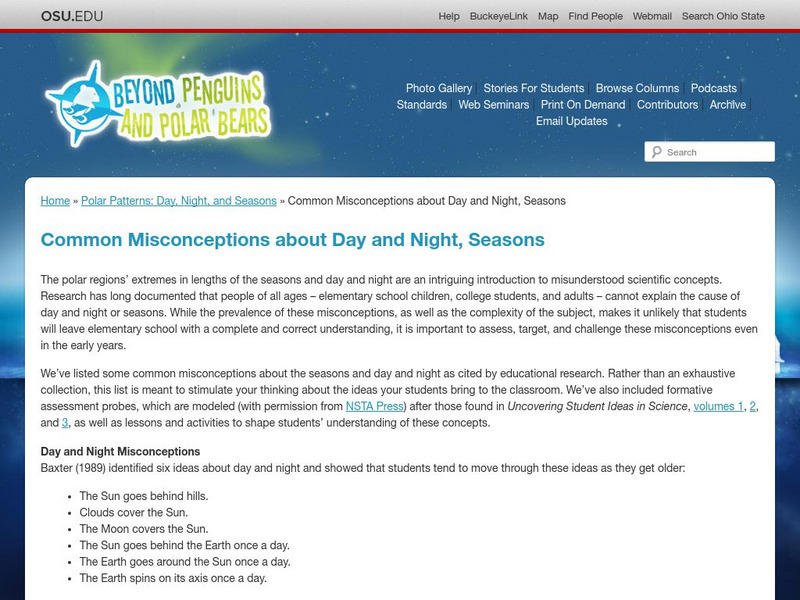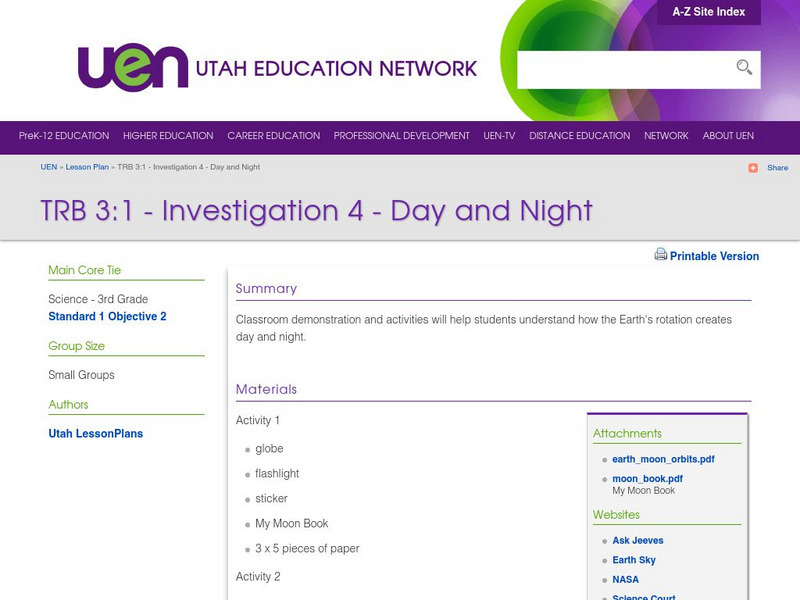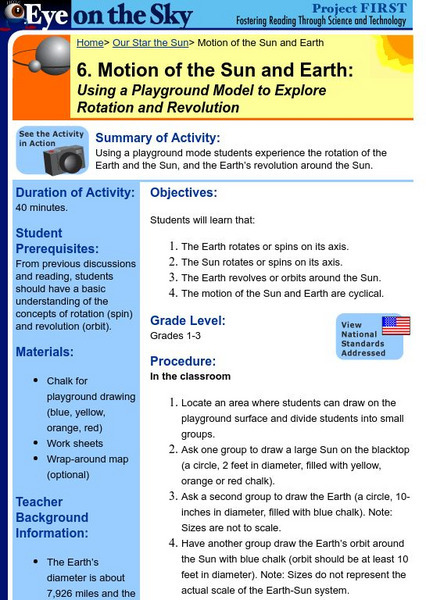Illustrative Mathematics
Illustrative Mathematics: G Mg Tilt of Earth's Axis and the Four Seasons
This task gives students a chance to explore the effects of the Earth's tilt and rotation using a simple geometric model of Earth-Sun interaction that shows why the seasons occur. Aligns with G-MG.A.1.
National Museums Liverpool
Liverpool Museums: The Sun Tracker
This simulation allows the user to see the sun's arc in the sky anywhere in the world at any time. By changing the season settings the user can see how seasons affect the height of the sun's arc.
CK-12 Foundation
Ck 12: Fifth Grade Science: Earth Science: Earth's Motion in Space
[Free Registration/Login may be required to access all resource tools.] Discusses the motion of the Earth with its day and night cycle, the seasons, the Earth's orbit around the Sun, and its year-long cycle.
Alabama Learning Exchange
Alex: Our Restless Planet
This unit will use demonstrations and student examples to help students gain an understanding of rotation, revolution, and orbit. Through hands-on activities students will explore the concepts of day and night. Technology will be...
Science Buddies
Science Buddies: Kinesthetic Astronomy: Earth's Rotation
This kinesthetic activity will demonstrate concepts like rotation and orbit, clarify movement and direction, and help students understand why earthlings see different things in the sky.
McREL International
Mcrel.org: Planet Rotation [Pdf]
A worksheet regarding the axis of rotation within each of the planets. PDF
McREL International
Mc Rel: Earth's Axis [Pdf]
A worksheet regarding the path of the Sun around the Earth and the Earth's tilt on its axis.
Science Education Resource Center at Carleton College
Serc: Mn Step: Rotation of the Earth
A KWL activity combined with a demonstration model. Students record their ideas and questions about why we have day and night. They then shine a flashlight (the Sun) on a rotating styrofoam ball (the Earth) and record their observations....
Ohio State University
Beyond Penguins and Polar Bears: Common Misconceptions About Day and Night
Misconceptions about the causes of seasons and day and night are common through all ages. Use the information on this site to help your students understand these concepts. Included are links to many resources and lesson plans for...
NASA
Nasa: Eclipse Predictions and Earth's Rotations
An insightful website from NASA that presents a series of different questions about the rotation of the Earth.
Geography 4 kids
Geography4 kids.com: Earth Around the Sun
Find out what all results from Earth revolving around the sun every 365 days as well as the rotation of the Earth every 24 hours.
ClassFlow
Class Flow: Day and Night
[Free Registration/Login Required] In this flipchart students will understand how the Earth rotates during a 24 hour period giving us day and night.
ClassFlow
Class Flow: Earth and Space Day and Night
[Free Registration/Login Required] This flipchart illustrates a view of the earth from space and how day and night happens.
ClassFlow
Class Flow: Earth's Movements in Space
[Free Registration/Login Required] This flipchart contains definitions for axis, rotation, revolution explanation of seasons and an assessment using Activotes.
Sophia Learning
Sophia: Earth and Sun
A slideshow exploring Earth's rotation and revolution around the sun. Learn that because of Earth's axis tilt we experience the seasons!
Utah Education Network
Uen: Trb 3:1: Investigation 4: Day and Night
A instructional activity for third graders in which they learn about the rotation of the Earth on its axis and how this movement creates day and night. They also examine the orbit of the moon about the Earth and the Earth's orbit around...
Cornell University
Cornell University: Astronomy: Eratosthenes
Learn how Greek mathematician Eratosthenes used geometry to estimate the circumference of the Earth.
Other
Center for Science Education: Eye on the Sky: What Makes Day and Night?
This activity will allow you to model day and night cycles. A rotating student holding a map (provided) models the earth. A lamp is used to model the sun. Numerous worksheets (pdf) and additional website resources are also provided.
Science Struck
Science Struck: A Scientific Explanation to What Causes Day and Night
Explains how the rotation and the axial tilt of the Earth are responsible for the phenomenon of day and night. Provides information about the Sun, the solar system, and the Earth, and how the circumference of the Earth was first measured...
Other
Center for Science Education: Eye on the Sky: Motion of the Sun and Earth
Students model the interaction of the earth and the sun. The activity is designed for the playground. You will need chalk, but all the other worksheets are provided.















